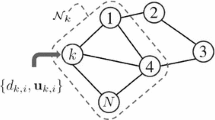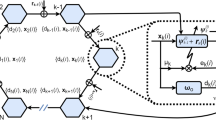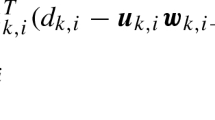Abstract
Diffusion least mean square (LMS) algorithm is a well-known algorithm for distributed estimation where estimation takes place at multiple nodes. However, it inherits slow convergence speed due to its gradient descent-based design. To deal with this challenge, we proposed a modified diffusion LMS with improved convergence performance by employing quantum-calculus-based gradient descent, and hence, we called it diffusion q-least mean square (Diff-qLMS). In the proposed design, we derive the weight update mechanism by minimizing the conventional mean square error (MSE) cost function via quantum-derivative in a distributed estimation environment. We developed two different modes of diffusion qLMS operation: combine-then-adapt (CTA) and adapt-then-combine (ATC). To improve the performance in terms of faster convergence and lower steady-state error, we also developed an efficient mechanism to obtain the optimal values of q-parameter for each tap-weight of the filter in order to achieve both faster convergence and lower steady-state error. With the aim to achieve the performance of the proposed algorithm theoretically, convergence analysis for both the transient and the steady-state scenarios is presented. Consequently, closed-form expressions governing both the transient and the steady-state behaviors in terms of mean square deviation (MSD) and excess mean square error (EMSE) for both local node and global network are derived. The theoretical claims are validated via Monte Carlo simulations. The performance of the proposed algorithm is investigated for various system noises and the results show the superiority of the proposed algorithm in terms of both the convergence speed and the steady-state error.







Similar content being viewed by others
Data Availability Statement
Data sharing is not applicable to this article as no datasets were generated or analyzed during the current study.
References
A. Ahmed, F.S. McFadden, R.K. Rayudu, q-calculus based extended kalman filter for the dynamic state estimation of a synchronous generator. 2016 IEEE Innovative Smart Grid Technologies - Asia (ISGT-Asia) pp. 1139–1144 (2016)
A. Ahmed, M. Moinuddin, U.M. Al-Saggaf, q-state space least mean family of algorithms. Circuits Syst. Signal Process. (2017). https://doi.org/10.1007/s00034-017-0569-7
A.U. Al-Saggaf, M. Arif, U. M. Al-Saggaf, M. Moinuddin, The q-normalized least mean square algorithm. In: 2016 6th International Conference on Intelligent and Advanced Systems (ICIAS), pp. 1–6 (2016)
U.M. Al-Saggaf, M. Moinuddin, M. Arif, A. Zerguine, The q-least mean squares algorithm. Signal Process. 111(C) (2015)
U.M. Al-Saggaf, M. Moinuddin, A. Zerguine, An efficient least mean squares algorithm based on q-gradient. In: 2014 48th Asilomar Conference on Signals, Systems and Computers, pp. 891–894 (2014)
S. Al-Sayed, A. Zoubir, A.H. Sayed, Robust distributed estimation by networked agents. IEEE Trans. Signal Process. (2017). https://doi.org/10.1109/TSP.2017.2703664
M. Arif, I. Naseem, M. Ashraf, M. Moinuddin, Design of incremental optimum error nonlinearity for distributed networks. In: 2017 International Conference on Innovations in Electrical Engineering and Computational Technologies (ICIEECT), pp. 1–5 (2017). https://doi.org/10.1109/ICIEECT.2017.7916525
M. Arif, I. Naseem, M. Moinuddin, State-space fractional-least mean square algorithm. In: 2017 First International Conference on Latest trends in Electrical Engineering and Computing Technologies (INTELLECT), pp. 1–4 (2017). https://doi.org/10.1109/INTELLECT.2017.8277637
M. Arif, I. Naseem, M. Moinuddin, U. M. Al-Saggaf, Design of optimum error nonlinearity for channel estimation in the presence of class-a impulsive noise. In: 2016 6th International Conference on Intelligent and Advanced Systems (ICIAS), pp. 1–6 (2016). https://doi.org/10.1109/ICIAS.2016.7824137
M. Arif, I. Naseem, M. Moinuddin, U.M. Al-Saggaf, Modified incremental lms with improved stability via convex combination of two adaptive filters. Circuits Syst. Signal Process. 38(9), 4245–4265 (2019). https://doi.org/10.1007/s00034-019-01061-w
M. Arif, I. Naseem, M. Moinuddin, S.S. Khan, M.M. Ammar, Adaptive noise cancellation using q-LMS. In: 2017 International Conference on Innovations in Electrical Engineering and Computational Technologies (ICIEECT), pp. 1–4 (2017)
M. Arif, I. Naseem, M. Moinuddin, U.M. Al-Saggaf, Design of an intelligent q-lms algorithm for tracking a non-stationary channel. Arab. J. Sci. Eng. 43(6), 2793–2803 (2018)
S. Bin, D. Muhammad, A. Zerguine, S. Zummo, A variable step-size strategy for distributed estimation over adaptive networks. EURASIP J. Adv. Signal Process. 135 (2013)
W.H.R. Chan, M. Wildemeersch, T.Q.S. Quek, Diffusion control in multi-agent networks. In: 2015 54th IEEE Conference on Decision and Control (CDC), pp. 4190–4195 (2015)
J. Chen, A.H. Sayed, Diffusion adaptation strategies for distributed optimization and learning over networks. IEEE Trans. Signal Process. 60(8), 4289–4305 (2012)
B.J. Fernandez, G.J. Arenas, M.T.M. Silva, L.A. Azpicueta, Ruiz: adaptive diffusion schemes for heterogeneous networks. IEEE Trans. Signal Process. 65(21), 5661–5674 (2017)
A. Frech, M. Klügel, P. Russer, Adaptive filtering for noise cancellation and signal analysis in real-time. In: 2013 European Microwave Conference (2013)
Ghauri, S.A., F., S.M.: System identification using lms, nlms and rls. In: 2013 IEEE Student Conference on Research and Development (2013)
S. Haykin, Adaptive filter theory, 4th edn. (Prentice Hall, Upper Saddle River, NJ, 2002)
F.H. Jackson, On q-functions and a certain difference operator. Trans. R. Soc. Edinb. 46, 253–281 (1908)
A. Khalili, A. Rastegarnia, S. Sanei, Performance analysis of incremental lms over flat fading channels. IEEE Trans. Control Netw. Syst. 4(3), 489–498 (2017)
S. Khan, A. Sadiq, I. Naseem, R. Togneri, M. Bennamoun, Enhanced \(q\)-least mean square. Circuits Syst. Signal Process. 38, 4817–4839 (2019)
H.S. Lee, S.E. Kim, J.W. Lee, W.J. Song, A variable step-size diffusion lms algorithm for distributed estimation. IEEE Trans. Signal Process. 63, 1–1 (2015)
J. Lee, J. Kong, W. Song, S. Kim, Data-reserved periodic diffusion lms with low communication cost over networks. IEEE Access 6, 54636–54650 (2018)
L. Li, Y. Zhang, J. A. Chambers, Variable length adaptive filtering within incremental learning algorithms for distributed networks. In: 2008 42nd Asilomar Conference on Signals, Systems and Computers, pp. 225–229 (2008). https://doi.org/10.1109/ACSSC.2008.5074397
C.G. Lopes, A.H. Sayed, Distributed adaptive incremental strategies: Formulation and performance analysis. In: 2006 IEEE International Conference on Acoustics Speech and Signal Processing Proceedings, vol. 3, pp. III–III (2006)
C.G. Lopes, A.H. Sayed, Diffusion least-mean squares over adaptive networks: formulation and performance analysis. IEEE Trans. Signal Process. 56(7), 3122–3136 (2008)
W.B. Lopes, C.G. Lopes, Incremental combination of rls and lms adaptive filters in nonstationary scenarios. In: 2013 IEEE International Conference on Acoustics, Speech and Signal Processing, pp. 5676–5680 (2013)
A.H.I. Makki, Dey, M.A., Khan, Comparative study on lms and cma channel equalization. In: 2010 International Conference on Information Society (2010)
V. Matta, C. Richard, V. Saligrama, A.H. Sayed, Guest editorial inference and learning over networks. IEEE Trans. Signal Inf. Process. Over Netw. 2, 423–425 (2016)
W. Mikhael, F. Wu, L. Kazovsky, G. Kang, L. Fransen, Adaptive filters with individual adaptation of parameters. IEEE Trans. Circuits Syst. 33(7) (1986)
J. Plata-Chaves, A. Bertrand, M. Moonen, Incremental multiple error filtered-x lms for node-specific active noise control over wireless acoustic sensor networks. In: 2016 IEEE Sensor Array and Multichannel Signal Processing Workshop (SAM) (2016)
M.G. Rabbat, R.D. Nowak, Decentralized source localization and tracking [wireless sensor networks]. In: 2004 IEEE International Conference on Acoustics, Speech, and Signal Processing, vol. 3, p. 921 (2004)
M.G. Rabbat, R.D. Nowak, Quantized incremental algorithms for distributed optimization. IEEE J. Sel. Areas Commun. 23(4), 798–808 (2005)
A. Rastegarnia, A. Khalili, W.M. Bazzi, S. Sanei, An incremental lms network with reduced communication delay. SIViP 10(4), 769–775 (2016)
S. Yim, H.L. Song, W. A proportionate diffusion lms algorithm for sparse distributed estimation. IEEE Trans. Circuits Syst. II Express Briefs 62(10), 992–996 (2015)
A.H. Sayed, Fundamentals of Adaptive Filtering (John Wiley & Sons, New Jersey, 2008)
A.H. Sayed, Diffusion adaptation over networks. In R. Chellapa and S. Theodoridis, editors, E-Reference Signal Processing 3, 323–454 (2012)
L. Shi, H. Zhao, Variable step-size distributed incremental normalised lms algorithm. Electron. Lett. 52(7), 519–521 (2016)
N. Takahashi, I. Yamada, Link probability control for probabilistic diffusion least-mean squares over resource-constrained networks. In: 2010 IEEE International Conference on Acoustics, Speech and Signal Processing, pp. 3518–3521 (2010)
N. Takahashi, I. Yamada, A. Sayed, Diffusion least-mean squares with adaptive combiners: formulation and performance analysis. IEEE Trans. Signal Process. 58(9), 4795–4810 (2010)
E. Vijay, K. Madisetti, B.W. Douglas, “Introduction to adaptive filters” digital signal processing handbook (1999)
L. Xiao, S. Boyd, S. Lai, A space-time diffusion scheme for peer-to-peer least-squares estimation. In: 2006 5th International Conference on Information Processing in Sensor Networks, pp. 168–176 (2006)
L. Xiao, S. Boyd, S. Lall, A scheme for robust distributed sensor fusion based on average consensus. In: IPSN 2005. Fourth International Symposium on Information Processing in Sensor Networks, 2005., pp. 63–70 (2005)
Acknowledgements
This work was funded by the Deanship of Scientific Research (DSR), King Abdulaziz University, Jeddah, under Grant no. (DF-209-135-1441). The authors, therefore, acknowledge with thanks DSR technical and financial supports.
Author information
Authors and Affiliations
Corresponding author
Additional information
Publisher's Note
Springer Nature remains neutral with regard to jurisdictional claims in published maps and institutional affiliations.
Rights and permissions
About this article
Cite this article
Arif, M., Moinuddin, M., Naseem, I. et al. Diffusion Quantum-Least Mean Square Algorithm with Steady-State Analysis. Circuits Syst Signal Process 41, 3306–3327 (2022). https://doi.org/10.1007/s00034-021-01934-z
Received:
Revised:
Accepted:
Published:
Issue Date:
DOI: https://doi.org/10.1007/s00034-021-01934-z




